宾语和宾语补足语
- 格式:doc
- 大小:66.50 KB
- 文档页数:20
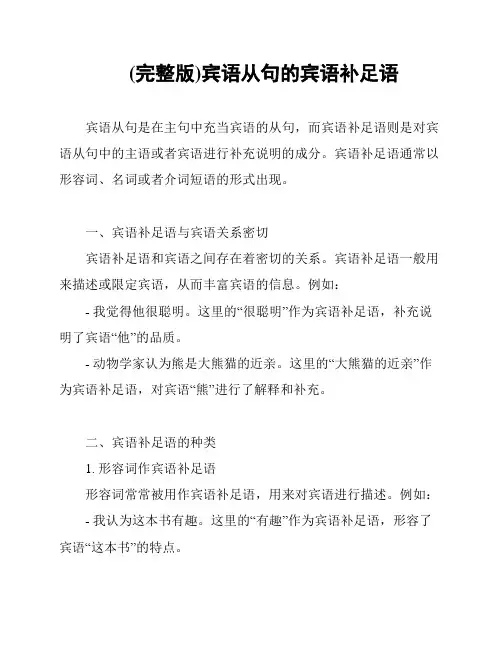
(完整版)宾语从句的宾语补足语宾语从句是在主句中充当宾语的从句,而宾语补足语则是对宾语从句中的主语或者宾语进行补充说明的成分。
宾语补足语通常以形容词、名词或者介词短语的形式出现。
一、宾语补足语与宾语关系密切宾语补足语和宾语之间存在着密切的关系。
宾语补足语一般用来描述或限定宾语,从而丰富宾语的信息。
例如:- 我觉得他很聪明。
这里的“很聪明”作为宾语补足语,补充说明了宾语“他”的品质。
- 动物学家认为熊是大熊猫的近亲。
这里的“大熊猫的近亲”作为宾语补足语,对宾语“熊”进行了解释和补充。
二、宾语补足语的种类1. 形容词作宾语补足语形容词常常被用作宾语补足语,用来对宾语进行描述。
例如:- 我认为这本书有趣。
这里的“有趣”作为宾语补足语,形容了宾语“这本书”的特点。
- 他觉得这个问题很难。
这里的“很难”作为宾语补足语,对宾语“这个问题”进行了评价。
2. 名词作宾语补足语名词也常常被用作宾语补足语,用来对宾语进行进一步的说明。
例如:- 我们坚信友谊是最宝贵的财富。
这里的“最宝贵的财富”作为宾语补足语,对宾语“友谊”进行了解释。
- 你们觉得他是一个好老师吗?这里的“一个好老师”作为宾语补足语,对宾语“他”进行了界定。
3. 介词短语作宾语补足语介词短语也可以用作宾语补足语,从而为宾语提供更多的细节信息。
例如:- 她对那个任务感到满意。
这里的“对那个任务”作为宾语补足语,表示了她的感受。
- 我们正在等待她的回答。
这里的“等待她的回答”作为宾语补足语,说明了我们的行为。
总结:宾语补足语是对宾语从句中的主语或者宾语进行补充说明的成分,常常以形容词、名词或者介词短语的形式出现。
它与宾语之间具有密切的关系,用来为宾语提供更多的信息和细节。
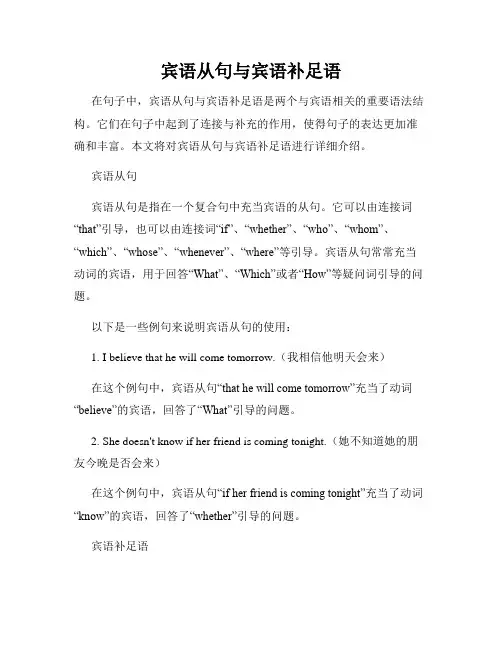
宾语从句与宾语补足语在句子中,宾语从句与宾语补足语是两个与宾语相关的重要语法结构。
它们在句子中起到了连接与补充的作用,使得句子的表达更加准确和丰富。
本文将对宾语从句与宾语补足语进行详细介绍。
宾语从句宾语从句是指在一个复合句中充当宾语的从句。
它可以由连接词“that”引导,也可以由连接词“if”、“whether”、“who”、“whom”、“which”、“whose”、“whenever”、“where”等引导。
宾语从句常常充当动词的宾语,用于回答“What”、“Which”或者“How”等疑问词引导的问题。
以下是一些例句来说明宾语从句的使用:1. I believe that he will come tomorrow.(我相信他明天会来)在这个例句中,宾语从句“that he will come tomorrow”充当了动词“believe”的宾语,回答了“What”引导的问题。
2. She doesn't know if her friend is coming tonight.(她不知道她的朋友今晚是否会来)在这个例句中,宾语从句“if her friend is coming tonight”充当了动词“know”的宾语,回答了“whether”引导的问题。
宾语补足语宾语补足语是指用来补充说明宾语或者对宾语进行修饰、补充的词、短语或从句。
宾语补足语通常用于及物动词后面,对动词的动作或状态进一步加以说明。
以下是一些例句来说明宾语补足语的使用:1. They made him their leader.(他们选他做他们的领导)在这个例句中,宾语补足语“their leader”进一步说明了他们对他的动作“made”的结果。
2. She considers him a talented musician.(她认为他是个有才华的音乐家)在这个例句中,宾语补足语“a talented musician”进一步说明了她对他的看法“considers”。
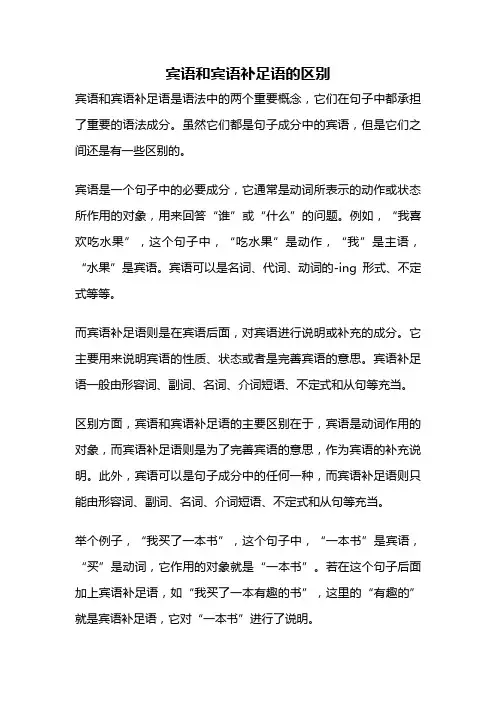
宾语和宾语补足语的区别宾语和宾语补足语是语法中的两个重要概念,它们在句子中都承担了重要的语法成分。
虽然它们都是句子成分中的宾语,但是它们之间还是有一些区别的。
宾语是一个句子中的必要成分,它通常是动词所表示的动作或状态所作用的对象,用来回答“谁”或“什么”的问题。
例如,“我喜欢吃水果”,这个句子中,“吃水果”是动作,“我”是主语,“水果”是宾语。
宾语可以是名词、代词、动词的-ing形式、不定式等等。
而宾语补足语则是在宾语后面,对宾语进行说明或补充的成分。
它主要用来说明宾语的性质、状态或者是完善宾语的意思。
宾语补足语一般由形容词、副词、名词、介词短语、不定式和从句等充当。
区别方面,宾语和宾语补足语的主要区别在于,宾语是动词作用的对象,而宾语补足语则是为了完善宾语的意思,作为宾语的补充说明。
此外,宾语可以是句子成分中的任何一种,而宾语补足语则只能由形容词、副词、名词、介词短语、不定式和从句等充当。
举个例子,“我买了一本书”,这个句子中,“一本书”是宾语,“买”是动词,它作用的对象就是“一本书”。
若在这个句子后面加上宾语补足语,如“我买了一本有趣的书”,这里的“有趣的”就是宾语补足语,它对“一本书”进行了说明。
再举个例子,“他认为我很聪明”,这个句子中,“我”是宾语,“认为”是动词,它所作用的对象就是“我”。
若在这个句子后面加上宾语补足语,如“他认为我很聪明的女孩”,这里的“很聪明的女孩”就是宾语补足语,它对“我”这个宾语进行了说明。
宾语和宾语补足语都是句子中非常重要的成分,它们的区别在于宾语是动词作用的对象,而宾语补足语则是对宾语进行补充说明,完善它的意思。
了解它们之间的区别,有助于我们更好地理解和运用它们。
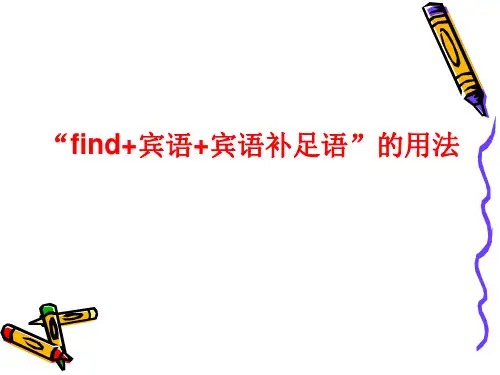
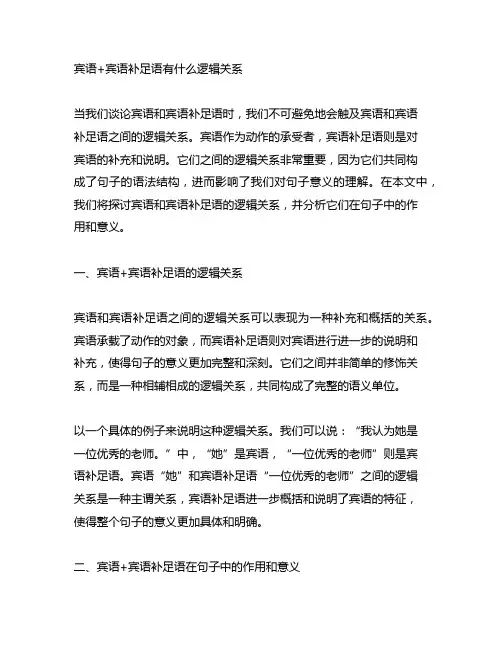
宾语+宾语补足语有什么逻辑关系当我们谈论宾语和宾语补足语时,我们不可避免地会触及宾语和宾语补足语之间的逻辑关系。
宾语作为动作的承受者,宾语补足语则是对宾语的补充和说明。
它们之间的逻辑关系非常重要,因为它们共同构成了句子的语法结构,进而影响了我们对句子意义的理解。
在本文中,我们将探讨宾语和宾语补足语的逻辑关系,并分析它们在句子中的作用和意义。
一、宾语+宾语补足语的逻辑关系宾语和宾语补足语之间的逻辑关系可以表现为一种补充和概括的关系。
宾语承载了动作的对象,而宾语补足语则对宾语进行进一步的说明和补充,使得句子的意义更加完整和深刻。
它们之间并非简单的修饰关系,而是一种相辅相成的逻辑关系,共同构成了完整的语义单位。
以一个具体的例子来说明这种逻辑关系。
我们可以说:“我认为她是一位优秀的老师。
”中,“她”是宾语,“一位优秀的老师”则是宾语补足语。
宾语“她”和宾语补足语“一位优秀的老师”之间的逻辑关系是一种主谓关系,宾语补足语进一步概括和说明了宾语的特征,使得整个句子的意义更加具体和明确。
二、宾语+宾语补足语在句子中的作用和意义宾语和宾语补足语共同构成了句子的核心部分,对句子的表达和传达起着至关重要的作用。
宾语承载了动作的对象,宾语补足语则对宾语进行了进一步的说明和概括,使得句子具备了更加丰富和深刻的语义内容。
它们共同赋予了句子更加具体和明确的意义,使得句子的表达更加丰富和生动。
另外,在句子中,宾语和宾语补足语之间还存在着一种逻辑关系,共同构成了句子的逻辑结构。
这种逻辑关系使得句子的表达更加清晰和连贯,有助于读者更好地理解句子的含义。
它们之间的协调和配合,使得句子具备了更加丰富和深刻的语义内涵,使得句子的表达更加生动和具体。
三、个人观点和理解对于宾语和宾语补足语之间的逻辑关系,我个人认为它们是一种相辅相成的关系。
宾语承载了动作的对象,而宾语补足语则对宾语进行了进一步的说明和概括,使得句子具备了更加丰富和深刻的语义内容。
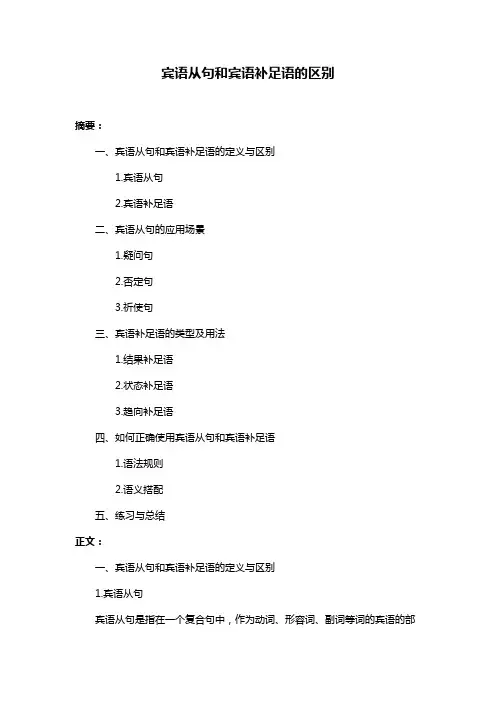
宾语从句和宾语补足语的区别摘要:一、宾语从句和宾语补足语的定义与区别1.宾语从句2.宾语补足语二、宾语从句的应用场景1.疑问句2.否定句3.祈使句三、宾语补足语的类型及用法1.结果补足语2.状态补足语3.趋向补足语四、如何正确使用宾语从句和宾语补足语1.语法规则2.语义搭配五、练习与总结正文:一、宾语从句和宾语补足语的定义与区别1.宾语从句宾语从句是指在一个复合句中,作为动词、形容词、副词等词的宾语的部分,通常由连词、疑问词等引导。
它与主句中的主语、谓语等成分相对应,起到补充说明的作用。
如:- I don"t know what he said.(我不知道他说了什么。
)2.宾语补足语宾语补足语是指在复合句中,动词的宾语部分补充说明宾语的状态、结果或趋向等语义信息。
它通常由介词、副词等引导。
如:- He looked the book up and down.(他翻阅了这本书。
)二、宾语从句的应用场景1.疑问句在疑问句中,通常用宾语从句来提问。
如:- What did he say?(他说了什么?)2.否定句在否定句中,宾语从句用来表示否定的对象。
如:- I didn"t buy anything.(我没有买任何东西。
)3.祈使句在祈使句中,宾语从句用来表示命令或请求的对象。
如:- Bring me the dictionary.(把字典给我带来。
)三、宾语补足语的类型及用法1.结果补足语结果补足语表示宾语所处的状态或结果。
如:- He made the cake rise.(他使蛋糕发酵。
)2.状态补足语状态补足语表示宾语的状态。
如:- She left the room quietly.(她安静地离开了房间。
)3.趋向补足语趋向补足语表示宾语的动作方向。
如:- He put the letter on the table.(他把信放在桌子上。
)四、如何正确使用宾语从句和宾语补足语1.语法规则在使用宾语从句和宾语补足语时,需要注意以下语法规则:- 宾语从句的引导词:连词(如that、whether等)、疑问词(如what、who等)。
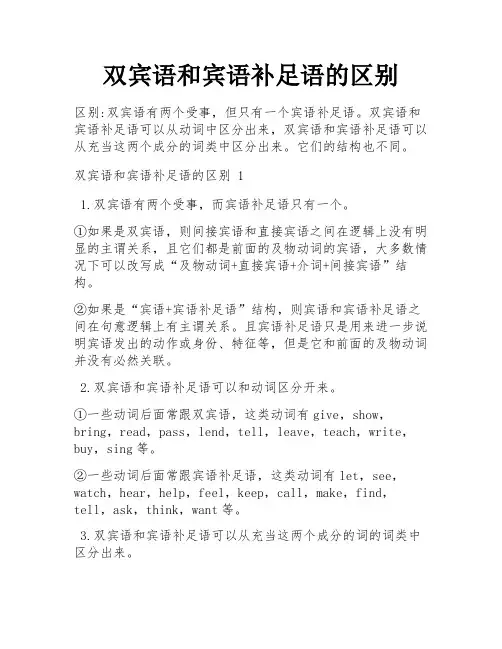
双宾语和宾语补足语的区别区别:双宾语有两个受事,但只有一个宾语补足语。
双宾语和宾语补足语可以从动词中区分出来,双宾语和宾语补足语可以从充当这两个成分的词类中区分出来。
它们的结构也不同。
双宾语和宾语补足语的区别 11.双宾语有两个受事,而宾语补足语只有一个。
①如果是双宾语,则间接宾语和直接宾语之间在逻辑上没有明显的主谓关系,且它们都是前面的及物动词的宾语,大多数情况下可以改写成“及物动词+直接宾语+介词+间接宾语”结构。
②如果是“宾语+宾语补足语”结构,则宾语和宾语补足语之间在句意逻辑上有主谓关系。
且宾语补足语只是用来进一步说明宾语发出的动作或身份、特征等,但是它和前面的及物动词并没有必然关联。
2.双宾语和宾语补足语可以和动词区分开来。
①一些动词后面常跟双宾语,这类动词有give,show,bring,read,pass,lend,tell,leave,teach,write,buy,sing等。
②一些动词后面常跟宾语补足语,这类动词有let,see,watch,hear,help,feel,keep,call,make,find,tell,ask,think,want等。
3.双宾语和宾语补足语可以从充当这两个成分的词的词类中区分出来。
①在双宾语中,能充当间接宾语或是直接宾语的一般是名词或代词。
②在宾语补足语中,能充当宾语补足语成分的则较多,如名词、形容词、副词、介词短语、动词不定式(短语)和分词(短语)。
双宾语和宾语补足语的区别 2双宾语结构:1、动词+间接宾语+直接宾语2、动词+直接宾语+for+间接宾语3、动词+直接宾语+to+间接宾语其中,间接宾语指人的,直接宾语指物的。
宾语补足语结构:1、动词+人(宾语)+动词原形2、动词+宾语+形容词3、动词+宾语+带to的不定式4、动词+宾语+省to的不定式5、动词+宾语+名词短语。
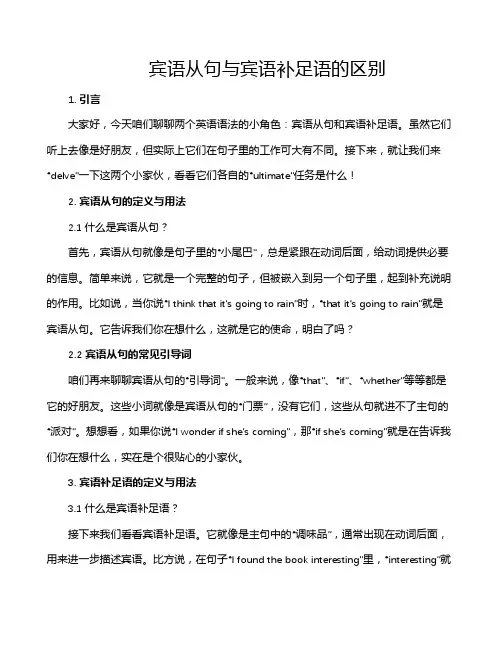
宾语从句与宾语补足语的区别1. 引言大家好,今天咱们聊聊两个英语语法的小角色:宾语从句和宾语补足语。
虽然它们听上去像是好朋友,但实际上它们在句子里的工作可大有不同。
接下来,就让我们来“delve”一下这两个小家伙,看看它们各自的“ultimate”任务是什么!2. 宾语从句的定义与用法2.1 什么是宾语从句?首先,宾语从句就像是句子里的“小尾巴”,总是紧跟在动词后面,给动词提供必要的信息。
简单来说,它就是一个完整的句子,但被嵌入到另一个句子里,起到补充说明的作用。
比如说,当你说“I think that it’s going to rain”时,“that it’s going to rain”就是宾语从句。
它告诉我们你在想什么,这就是它的使命,明白了吗?2.2 宾语从句的常见引导词咱们再来聊聊宾语从句的“引导词”。
一般来说,像“that”、“if”、“whether”等等都是它的好朋友。
这些小词就像是宾语从句的“门票”,没有它们,这些从句就进不了主句的“派对”。
想想看,如果你说“I wonder if she’s coming”,那“if she’s coming”就是在告诉我们你在想什么,实在是个很贴心的小家伙。
3. 宾语补足语的定义与用法3.1 什么是宾语补足语?接下来我们看看宾语补足语。
它就像是主句中的“调味品”,通常出现在动词后面,用来进一步描述宾语。
比方说,在句子“I found the book interesting”里,“interesting”就是宾语补足语,它告诉我们这本书有多有趣。
宾语补足语可以是形容词、名词或其他结构,反正就是让宾语更丰满、更生动。
3.2 宾语补足语的作用与示例想象一下,咱们在餐厅点了道菜,服务员就会问:“这道菜怎么样?”我们可以回答:“I found the soup delicious.”在这里,“delicious”就是宾语补足语,它帮助我们更好地传达出对汤的评价。
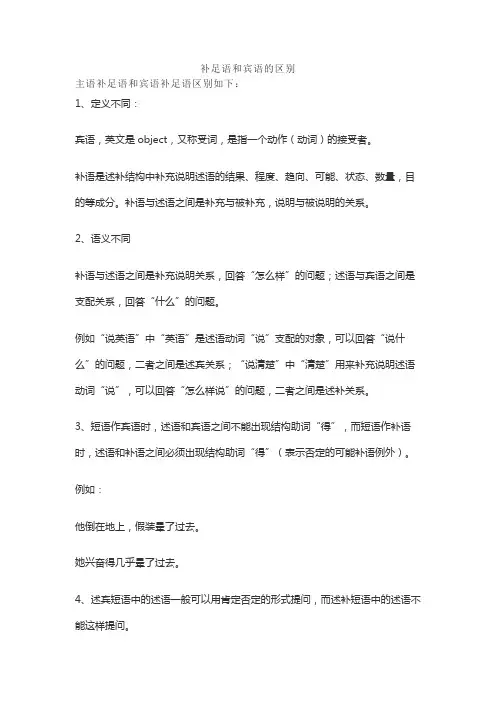
补足语和宾语的区别
主语补足语和宾语补足语区别如下:
1、定义不同:
宾语,英文是object,又称受词,是指一个动作(动词)的接受者。
补语是述补结构中补充说明述语的结果、程度、趋向、可能、状态、数量,目的等成分。
补语与述语之间是补充与被补充,说明与被说明的关系。
2、语义不同
补语与述语之间是补充说明关系,回答“怎么样”的问题;述语与宾语之间是支配关系,回答“什么”的问题。
例如“说英语”中“英语”是述语动词“说”支配的对象,可以回答“说什么”的问题,二者之间是述宾关系;“说清楚”中“清楚”用来补充说明述语动词“说”,可以回答“怎么样说”的问题,二者之间是述补关系。
3、短语作宾语时,述语和宾语之间不能出现结构助词“得”,而短语作补语时,述语和补语之间必须出现结构助词“得”(表示否定的可能补语例外)。
例如:
他倒在地上,假装晕了过去。
她兴奋得几乎晕了过去。
4、述宾短语中的述语一般可以用肯定否定的形式提问,而述补短语中的述语不能这样提问。
例如:
说英语—→说不说英语
说清楚—→*说不说清楚
5、宾语有时可以移至述语前,构成受事主语句或把字句。
例如:
我洗完了衣服—→我把衣服洗完了。
这里的宾语“衣服”前置。
他浪费了两个小时—→他把两个小时浪费了。
这里把宾语“两个小时”前置。
补语的位置比较固定,只能出现在述语后面。
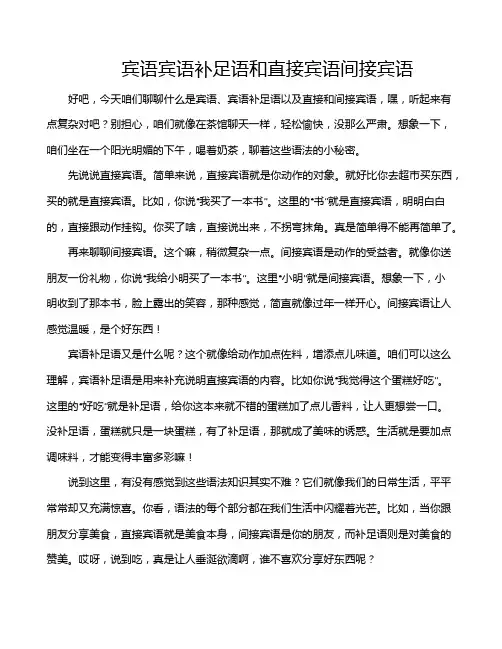
宾语宾语补足语和直接宾语间接宾语好吧,今天咱们聊聊什么是宾语、宾语补足语以及直接和间接宾语,嘿,听起来有点复杂对吧?别担心,咱们就像在茶馆聊天一样,轻松愉快,没那么严肃。
想象一下,咱们坐在一个阳光明媚的下午,喝着奶茶,聊着这些语法的小秘密。
先说说直接宾语。
简单来说,直接宾语就是你动作的对象。
就好比你去超市买东西,买的就是直接宾语。
比如,你说“我买了一本书”。
这里的“书”就是直接宾语,明明白白的,直接跟动作挂钩。
你买了啥,直接说出来,不拐弯抹角。
真是简单得不能再简单了。
再来聊聊间接宾语。
这个嘛,稍微复杂一点。
间接宾语是动作的受益者。
就像你送朋友一份礼物,你说“我给小明买了一本书”。
这里“小明”就是间接宾语。
想象一下,小明收到了那本书,脸上露出的笑容,那种感觉,简直就像过年一样开心。
间接宾语让人感觉温暖,是个好东西!宾语补足语又是什么呢?这个就像给动作加点佐料,增添点儿味道。
咱们可以这么理解,宾语补足语是用来补充说明直接宾语的内容。
比如你说“我觉得这个蛋糕好吃”。
这里的“好吃”就是补足语,给你这本来就不错的蛋糕加了点儿香料,让人更想尝一口。
没补足语,蛋糕就只是一块蛋糕,有了补足语,那就成了美味的诱惑。
生活就是要加点调味料,才能变得丰富多彩嘛!说到这里,有没有感觉到这些语法知识其实不难?它们就像我们的日常生活,平平常常却又充满惊喜。
你看,语法的每个部分都在我们生活中闪耀着光芒。
比如,当你跟朋友分享美食,直接宾语就是美食本身,间接宾语是你的朋友,而补足语则是对美食的赞美。
哎呀,说到吃,真是让人垂涎欲滴啊,谁不喜欢分享好东西呢?生活中的每一个小细节其实都是语法的缩影。
你吃了好吃的,跟朋友聊了开心的事,都是在用不同的方式表达情感。
直接宾语、间接宾语和宾语补足语,就像朋友之间的互动,各自发挥着重要的作用。
我们说话不经意间就把这些元素都用上了,这就是语言的魅力所在。
嘿,有时候你可能会觉得,语法就是一堆无聊的规则,怎么能跟我们的生活挂钩呢?其实不然,生活中的每一次交流、每一个故事,都是在用这些语法的规则串联起来的。
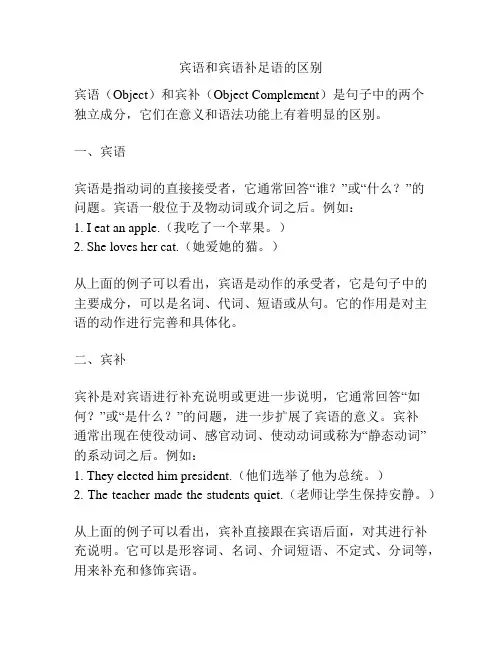
宾语和宾语补足语的区别宾语(Object)和宾补(Object Complement)是句子中的两个独立成分,它们在意义和语法功能上有着明显的区别。
一、宾语宾语是指动词的直接接受者,它通常回答“谁?”或“什么?”的问题。
宾语一般位于及物动词或介词之后。
例如:1. I eat an apple.(我吃了一个苹果。
)2. She loves her cat.(她爱她的猫。
)从上面的例子可以看出,宾语是动作的承受者,它是句子中的主要成分,可以是名词、代词、短语或从句。
它的作用是对主语的动作进行完善和具体化。
二、宾补宾补是对宾语进行补充说明或更进一步说明,它通常回答“如何?”或“是什么?”的问题,进一步扩展了宾语的意义。
宾补通常出现在使役动词、感官动词、使动动词或称为“静态动词”的系动词之后。
例如:1. They elected him president.(他们选举了他为总统。
)2. The teacher made the students quiet.(老师让学生保持安静。
)从上面的例子可以看出,宾补直接跟在宾语后面,对其进行补充说明。
它可以是形容词、名词、介词短语、不定式、分词等,用来补充和修饰宾语。
宾补与宾语的最主要区别在于:1. 宾补是对宾语的进一步补充或说明,它强调补充的内容与宾语之间的关系;而宾语则是动作的承受者,它更直接地接受动作。
2. 宾补的存在是为了完善宾语的意义,扩展宾语的信息;而宾语本身则是动作的指向对象。
3. 当动词的意义需要进一步说明时,用宾补;当动词的意义已经明确无需补充时,用宾语即可。
总体来说,宾补起到对宾语进行进一步说明和补充的作用,对句子的意义和信息起到了一定的拓展。
宾补和宾语在句子中扮演了不同的角色,并且具有不同的语法功能。
因此,在学习和理解句子结构和语法规则时,需要注意宾语与宾补的区别。
宾补的结构宾语补足语(Object Complement,简称宾补)是英语句法中的一个重要组成部分。
它出现在某些及物动词后面,用来对宾语进行补充说明,表达宾语的动作、状态、特征或身份等。
宾补结构的基本形式如下:主语 + 谓语动词(及物动词) + 宾语 + 宾语补足语例如:1. 名词作宾补:I consider him my friend . (我认为他是我的朋友)主语:I谓语动词:consider宾语:him宾语补足语:my friend2. 形容词作宾补:She found the room empty . (她发现房间是空的)主语:She谓语动词:found宾语:the room宾语补足语:empty3. 副词作宾补:He left the door open . (他让门开着)主语:He谓语动词:left宾语:the door宾语补足语:open4. 不定式作宾补:We want you to come with us. (我们希望你和我们一起来)主语:We谓语动词:want宾语:you宾语补足语:to come5. 现在分词作宾补:The news made her excited . (这个消息使她感到兴奋)主语:The news谓语动词:made宾语:her宾语补足语:excited6. 过去分词作宾补:They considered him a genius . (他们认为他是天才)主语:They谓语动词:considered宾语:him宾语补足语:a genius7. 介词短语作宾补:I saw a man in the park . (我看见一个人在公园里)主语:I谓语动词:saw宾语:a man宾语补足语:in the park。
宾语从句和宾语补足语的区别
宾语从句和宾语补足语在语法上有着明显的区别。
宾语从句是指在一个句子中充当宾语的从句,而宾语补足语则是在一个句子中对宾语进行补充或说明的成分。
首先,宾语从句是一个完整的句子,可以独立成立,具有主语、谓语和宾语的完整结构。
它通常由连接词引导,如that、if、whether等。
例如:I know that he is coming.(我知道他要来。
)这里的“that he is coming”就是一个宾语从句。
相比之下,宾语补足语不是一个完整的句子,而是对宾语进行补充或说明的成分。
它可以是名词、形容词、副词或介词短语等。
例如:I find the book interesting.(我觉得这本书有趣。
)这里的“interesting”就是对宾语“the book”的补足语。
其次,宾语从句在语序上通常和陈述句一样,即主语在前,谓语动词在中间,宾语从句在最后。
而宾语补足语则没有固定的位置,可以出现在宾语的前面、后面或中间,具体位置取决于句子的需要。
此外,宾语从句和宾语补足语在功能和意义上也有一些区别。
宾语从句通常起到句子的主要成分,对整个句子的意义和逻辑关系起到重要作用。
而宾语补足语则更多地起到修饰或补充宾语的作用,对宾语进行进一步的说明或限定。
总结起来,宾语从句是一个完整的句子,在语序上和陈述句相同,起到句子的主要成分;而宾语补足语则是对宾语进行补充或说明的成分,位置灵活,功能是修饰或补充宾语。
正确理解和运用宾语从句和宾语补足语,对于提高语言表达的准确性和丰富性具有重要意义。
矿产资源开发利用方案编写内容要求及审查大纲
矿产资源开发利用方案编写内容要求及《矿产资源开发利用方案》审查大纲一、概述
㈠矿区位置、隶属关系和企业性质。
如为改扩建矿山, 应说明矿山现状、
特点及存在的主要问题。
㈡编制依据
(1简述项目前期工作进展情况及与有关方面对项目的意向性协议情况。
(2 列出开发利用方案编制所依据的主要基础性资料的名称。
如经储量管理部门认定的矿区地质勘探报告、选矿试验报告、加工利用试验报告、工程地质初评资料、矿区水文资料和供水资料等。
对改、扩建矿山应有生产实际资料, 如矿山总平面现状图、矿床开拓系统图、采场现状图和主要采选设备清单等。
二、矿产品需求现状和预测
㈠该矿产在国内需求情况和市场供应情况
1、矿产品现状及加工利用趋向。
2、国内近、远期的需求量及主要销向预测。
㈡产品价格分析
1、国内矿产品价格现状。
2、矿产品价格稳定性及变化趋势。
三、矿产资源概况
㈠矿区总体概况
1、矿区总体规划情况。
2、矿区矿产资源概况。
3、该设计与矿区总体开发的关系。
㈡该设计项目的资源概况
1、矿床地质及构造特征。
2、矿床开采技术条件及水文地质条件。
矿产资源开发利用方案编写内容要求及审查大纲
矿产资源开发利用方案编写内容要求及《矿产资源开发利用方案》审查大纲一、概述
㈠矿区位置、隶属关系和企业性质。
如为改扩建矿山, 应说明矿山现状、
特点及存在的主要问题。
㈡编制依据
(1简述项目前期工作进展情况及与有关方面对项目的意向性协议情况。
(2 列出开发利用方案编制所依据的主要基础性资料的名称。
如经储量管理部门认定的矿区地质勘探报告、选矿试验报告、加工利用试验报告、工程地质初评资料、矿区水文资料和供水资料等。
对改、扩建矿山应有生产实际资料, 如矿山总平面现状图、矿床开拓系统图、采场现状图和主要采选设备清单等。
二、矿产品需求现状和预测
㈠该矿产在国内需求情况和市场供应情况
1、矿产品现状及加工利用趋向。
2、国内近、远期的需求量及主要销向预测。
㈡产品价格分析
1、国内矿产品价格现状。
2、矿产品价格稳定性及变化趋势。
三、矿产资源概况
㈠矿区总体概况
1、矿区总体规划情况。
2、矿区矿产资源概况。
3、该设计与矿区总体开发的关系。
㈡该设计项目的资源概况
1、矿床地质及构造特征。
2、矿床开采技术条件及水文地质条件。
矿产资源开发利用方案编写内容要求及审查大纲
矿产资源开发利用方案编写内容要求及《矿产资源开发利用方案》审查大纲一、概述
㈠矿区位置、隶属关系和企业性质。
如为改扩建矿山, 应说明矿山现状、
特点及存在的主要问题。
㈡编制依据
(1简述项目前期工作进展情况及与有关方面对项目的意向性协议情况。
(2 列出开发利用方案编制所依据的主要基础性资料的名称。
如经储量管理部门认定的矿区地质勘探报告、选矿试验报告、加工利用试验报告、工程地质初评资料、矿区水文资料和供水资料等。
对改、扩建矿山应有生产实际资料, 如矿山总平面现状图、矿床开拓系统图、采场现状图和主要采选设备清单等。
二、矿产品需求现状和预测
㈠该矿产在国内需求情况和市场供应情况
1、矿产品现状及加工利用趋向。
2、国内近、远期的需求量及主要销向预测。
㈡产品价格分析
1、国内矿产品价格现状。
2、矿产品价格稳定性及变化趋势。
三、矿产资源概况
㈠矿区总体概况
1、矿区总体规划情况。
2、矿区矿产资源概况。
3、该设计与矿区总体开发的关系。
㈡该设计项目的资源概况
1、矿床地质及构造特征。
2、矿床开采技术条件及水文地质条件。
矿产资源开发利用方案编写内容要求及审查大纲
矿产资源开发利用方案编写内容要求及《矿产资源开发利用方案》审查大纲一、概述
㈠矿区位置、隶属关系和企业性质。
如为改扩建矿山, 应说明矿山现状、
特点及存在的主要问题。
㈡编制依据
(1简述项目前期工作进展情况及与有关方面对项目的意向性协议情况。
(2 列出开发利用方案编制所依据的主要基础性资料的名称。
如经储量管理部门认定的矿区地质勘探报告、选矿试验报告、加工利用试验报告、工程地质初评资料、矿区水文资料和供水资料等。
对改、扩建矿山应有生产实际资料, 如矿山总平面现状图、矿床开拓系统图、采场现状图和主要采选设备清单等。
二、矿产品需求现状和预测
㈠该矿产在国内需求情况和市场供应情况
1、矿产品现状及加工利用趋向。
2、国内近、远期的需求量及主要销向预测。
㈡产品价格分析
1、国内矿产品价格现状。
2、矿产品价格稳定性及变化趋势。
三、矿产资源概况
㈠矿区总体概况
1、矿区总体规划情况。
2、矿区矿产资源概况。
3、该设计与矿区总体开发的关系。
㈡该设计项目的资源概况
1、矿床地质及构造特征。
2、矿床开采技术条件及水文地质条件。
宾语和宾语补足语1. 双宾语直接宾语和间接宾语双宾语就是有些动词后面跟直接宾语和间接宾语. 直接宾语指的是动词所涉及的物,间接宾语是指受益于动词所表示的行为的人.We owe the university 400 dollars for Jenny's tuition.They sent us a bill for the new semester .(在英语中,有些动词接了一个宾语后句子意思仍不完整,还需要再加上一个词或短语放在宾语之后来补充说明其身份、特征、状态或所做的动作,这种“宾语+宾语补足语”结构称为复合宾语)在双宾语中,两个宾语间的关系比较松散,有的句子去掉其中一个宾语,句子仍然成立。
双宾语一般表示“为谁(for sb.)或给谁(to sb.)……”,即“及物动词+间接宾语+直接宾语”的结构可以改写为“及物动词+直接宾语+for sb.或to sb.”的结构。
例如:He brings me cookies every day.She made me a beautiful dress.常跟双宾语的动词有:to: advance, allot, allow, award, bring, cause, deal, deliver, deny, do, feed, fetch, forward, give, grant, hand, leave, lend, loan, mail, offer, owe, pass, pay, play, post, proffer, promise, quote, read, recommend, refuse, render, rent, replay, restore, return, sell, send, serve, show, sing, take, teach, tell, throw, tell, toss, write for: boil, book, bring, build, buy, call, cash, choose, cook, cut, design, do, fetch, fill, find, fix, gather, get, grow, guarantee, keep, leave, make, mix, order, paint, pick, play, pour, prepare, pull, reach, reserve, save, secure, set, sing, spare, spread, take, win, write, yield(to还是for,这里没有固定的规则,主要取决于不同动词的性质,以及句子的意思。
简单的理解:to sb.:给谁for sb.:为谁。
所以这里的一些常用词的搭配,需要记忆。
)bring, leave, play, sing, take, write既可以接to又可以接for, 但意义不同.Karen wrote a letter to/for her boy friend.She left her estate to/for her brother. To已继承; FOR有继承权其它介词He asked another question of the speaker.The court accused him of theft.The court charged him with theft.The gunmen robbed millions of dollars of the bank.He struck a violent blow at her.不能改为介词宾语的间接宾语特别由下列动词引导: allow, ask(one his name), bet, bid, cost, nevy, forgive, give (one some uneasiness), hit (one a blow), keep (me company), last, lay, lead (her an awful life), make (me curtsy), pardon, permit, play one a trick, reach me my hat, refuse, save me trouble, spare, strike the enemy a shrewd blow, take, wishThe manager allowed him one week of vacation in the summer.夏天经理给他一星期的假期。
He wished me good morning [good-bye].他向我道早安[告别]。
宾语从句/复合结构必须放在后面:He assured me that I might come back whenever I liked.She taught her child how to swim.事件和宾格代词作间接宾语He gave the door a push. 不能说: a push to the doorThe headmaster gave it to him./it to John/the book to John 一般用法双宾语的被动语态:They offered Mr. Jenkins the mastership.The mastership was offered (to) Mr. Jenkins. To Mr. Jenkins the mastership was offered.介词宾语V+Prep. 只有一个宾语He called unexpectedly on John.Did he call on John or (on) Mary?V+Prep. 有两个宾语及物动词+名词/代词+介词Address to/announce to/ blame on/ communicate to/ confine to/ congratulate on/deprive of/ explain to/ forgive for/ order for /ply with/ protest from/ provide with/ remind of /say to/tell about/thank forHe confined his remarks to that subject.及物动词+名词+介词(属于习语类)Lay emphasis on/make allowance for/make a mess of/make an example of/ make much of/ make no mention of/pay attention to/ take care of/ take advantage of/take note ofHe took undue advantage of his weakness. They made a horrible mess of the room after the party,2. 复合宾语=复杂宾语宾语+宾补That would drive me mad.He has proved himself an experienced teacher. We regard this crisis as a danger to world peace.What makes you in such a hurry?We consider him to be the best boy in the school.I noticed the manager pass my office.I heard someone knocking at the door.She had an arm broken in the accident.宾补的位置The carpenter will make good the broken chairleg.3.形式宾语英语中,常用“it”作形式宾语代替宾语从句,把真正的宾语从句后置,特别是在带复合宾语的句子中。
I hate ________ when people talk with their mouths full.A. itB. thatC. thoseD. them“it”充当形式宾语,宾语从句后置的情况有下列几种:⑴在believe, consider, declare, estimate, fancy, feel, find, guess, hear, imagine, know, make, prove, reckon, think, understand 等动词接复合宾语(宾语+宾补)时,要用it作形式宾语。
在这种结构中that不可省略。
例如:We find it difficult that we should finish the work on time.我发现我们按时完成工作有困难。
She thinks it wrong that he didn't answer the phone.她认为他不接电话是不对的。
⑵由动词和介词构成的短语动词后接that 宾语从句时,要用形式宾语。
We are thinking of it that we'll lend you some money. 我正在考虑借给你钱的事。
I shall see to it that he is taken good care of when you are absent.你不在的时候我负责把他照顾好。
⑶用于“动词+宾语+介词短语”的句型中。
Keep it in mind that you have to be home by ten o'clock.要记住你得十点钟之前回家。
We took it for granted that he would come. 我们认为他来是当然的。
⑷不可直接接宾语从句的情况。
在like, enjoy, love, hate, take 等表“喜怒哀乐”的动词,后若要跟宾语从句,需跟形式宾语it。
I hate it when people talk with their mouths full. 我不喜欢人们满口饭说话。
I like it that everyone passed the exam. 都通过了考试我很喜欢。
⑸不可直接跟that从句的情况。
下列动词不可直接接that从句:ask, refuse, let, like, cause, force, condemn, admire, celebrate, entreat, dislike(厌恶), overlook, love, help, take, forgive, bid, hate, hear(听见), see(看见), want(想要) 等,但可用it, the fact 做媒介,后接that从句;或接动名词、不定式。